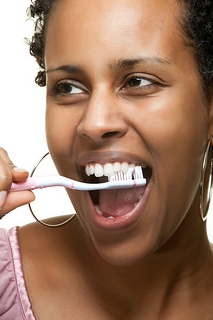
It’s a new year, and it couldn’t come fast enough for many of us! Let’s do our part to make this a better year in every way—and you can start by making this the year you quit smoking once and for all.
You know that smoking is very damaging to your body. Smokers are more likely to suffer from lung disease, heart attacks, and strokes. You’re at greater risk for cancer, high blood pressure, blood clots, and blood vessel disorders. With far-reaching consequences like this, it’s no surprise that your oral health suffers when you smoke as well.
How does smoking affect your teeth and mouth?
While this is possibly the least harmful side effect of smoking, it’s a very visible one. Tar and nicotine start staining teeth right away. After months and years of smoking, your teeth can take on an unappealing dark yellow, orange, or brown color. Tobacco staining might require professional whitening treatments because it penetrates the enamel over time.
Bacterial plaque and tartar cause cavities and gum disease, and smokers suffer from plaque and tartar buildup more than non-smokers do. Tartar, hardened plaque that can only be removed by a dental professional, is especially hard on delicate gum tissue.
The chemicals in cigarettes linger on the surfaces of your mouth causing an unpleasant odor, but that’s not the only source of smoker’s breath. Smoking also dries out the mouth, and, without the normal flow of saliva to wash away food particles and bacteria, bad breath results. Another common cause of bad breath? Gum disease, which is also found more frequently among smokers.
Smoking has been linked to greater numbers of harmful oral bacteria in the mouth and a greater risk of gingivitis (early gum disease). Periodontitis, or severe gum disease, is much more common among smokers, and can lead to bone and tooth loss. Unsurprisingly, tooth loss is also more common among smokers.
Tooth implants look and function like our original teeth, and are one of the best solutions for tooth loss. While implant failure isn’t common, it does occur significantly more often among smokers. Studies suggest that there are multiple factors at work, which may include a smoker’s bone quality and density, gum tissue affected by constricted blood vessels, and compromised healing.
Smoking has been linked to weakened immune systems, so it’s harder to fight off an infection and to heal after an injury. Because smoking affects the immune system’s response to inflammation and infection, smokers suffering from gum disease don’t respond as well to treatment. Smokers experience a higher rate of root infections, and smoking also slows the healing process after oral surgeries or trauma.
Smoking following a tooth extraction can cause a painful condition called “dry socket.” After extraction, a clot forms to protect the tooth socket. Just as this clot can be dislodged by sucking through a straw or spitting, it can also be dislodged by the force of inhaling and exhaling while smoking.
Research has shown again and again that smoking is the single most serious risk factor for oral cancer. Studies have also shown that you reduce your risk of oral cancer significantly when you quit smoking.
Quitting smoking is a major accomplishment that will improve your life on every level. It’s always a good idea to talk to Drs Julie Bailey, Jacob Woods, Marci, Glenn, and Brian Beck for strategies to help you achieve your wellness goals for the new year. Make this the year you stop smoking, and the year your health improves in countless ways because you did.





 Website Powered by Sesame 24-7™
Website Powered by Sesame 24-7™